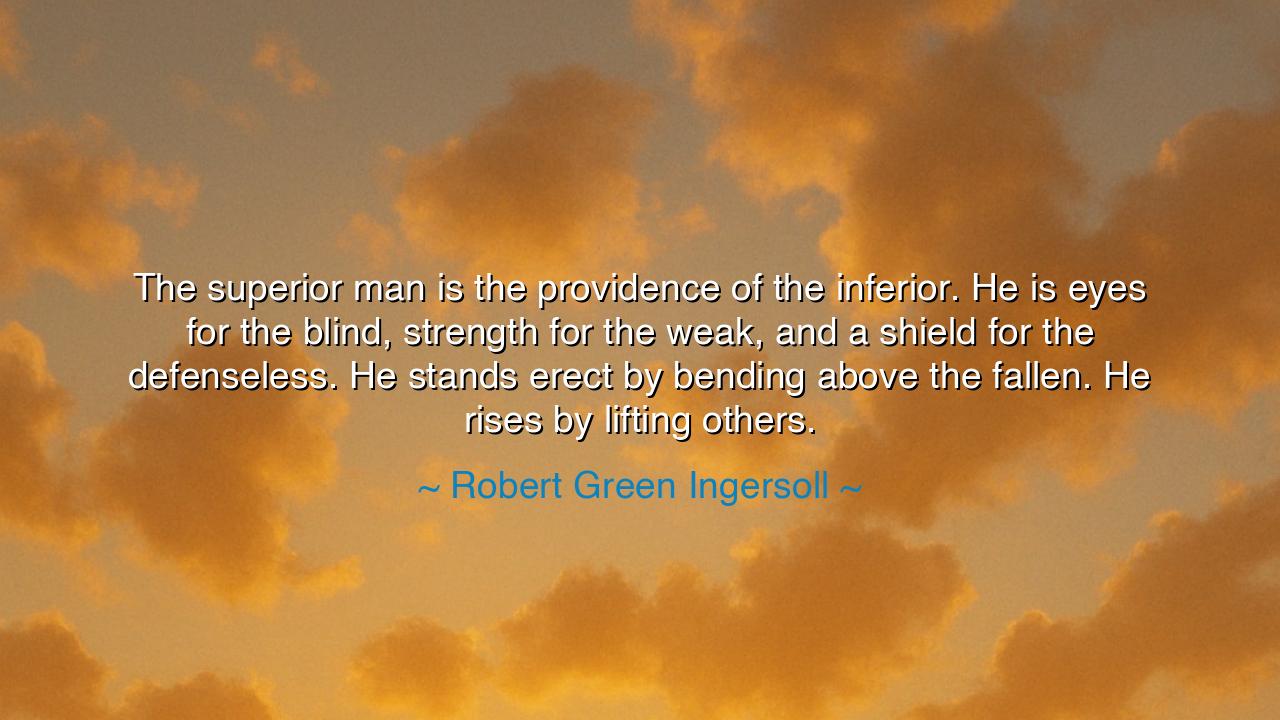
The superior man is the providence of the inferior. He is eyes
The superior man is the providence of the inferior. He is eyes for the blind, strength for the weak, and a shield for the defenseless. He stands erect by bending above the fallen. He rises by lifting others.






Robert Green Ingersoll, with a voice both prophetic and compassionate, declares: “The superior man is the providence of the inferior. He is eyes for the blind, strength for the weak, and a shield for the defenseless. He stands erect by bending above the fallen. He rises by lifting others.” In these words resounds a vision of true greatness—not the greatness of conquest, nor the false majesty of wealth and power, but the greatness of service. To Ingersoll, the superior man is not one who towers over others in pride, but one who bends down in mercy, who lifts the broken and becomes a living source of providence for those who cannot sustain themselves.
The origin of this thought is deeply rooted in both ancient wisdom and the human heart. Ingersoll, though known as the “Great Agnostic,” spoke truths that echo the oldest teachings of prophets and sages. For what did the ancients say? That the king is father to his people, that the warrior defends the widow and the orphan, that the shepherd lays down his life for the flock. Thus, Ingersoll gathers into his words the timeless law: that the measure of a man’s greatness is not how high he climbs, but how many he lifts with him. Strength without compassion is tyranny; but strength used for others is virtue.
Think of Marcus Aurelius, emperor of Rome, sitting weary after battle, yet writing in his Meditations that he must live “for the sake of men.” Surrounded by soldiers, courtiers, and intrigues, he reminded himself daily that he was to be “a shield for the defenseless,” that the empire’s strength existed not for its rulers but for its people. Or recall Abraham Lincoln, bowed down beneath the terrible burden of civil war, who once said, “I must stand with anybody that stands right, stand with him while he is right, and part with him when he goes wrong.” These men, though mighty in power, proved their true superiority by bending above the fallen and rising only as they lifted others.
But the lesson is not for emperors and presidents alone. Let us look to Florence Nightingale, who in the barracks of Scutari became “eyes for the blind” soldiers, “strength for the weak” who lay in fever, “a shield for the defenseless” against neglect and indifference. She bent over the fallen men of war, washing their wounds by lamplight, and in so doing, she rose—not for herself, but for humanity. In her, Ingersoll’s words are made flesh, showing that the superior one is made noble not by privilege, but by sacrifice.
The imagery of “standing erect by bending above the fallen” contains a paradox both beautiful and eternal. For the proud who stand tall in arrogance shall fall; but the humble who bend in service shall rise with a strength unshaken. Just as a tree grows not by clutching the sky, but by sinking its roots into the earth, so too the superior man grows by sinking into compassion, anchoring himself in the needs of others. He who lifts another from the dust himself ascends, and his ascent is secure, for it is bound to the common good.
What lesson, then, should the listener draw? It is this: that every man and woman is given strength in some measure—not for self alone, but for others. You may not be emperor, nor soldier, nor healer of nations, but you may yet be a light in a friend’s darkness, a steady arm for one who trembles, a defender of one who cannot speak for themselves. In the smallest acts—guiding a lost soul, protecting the weak, speaking truth against injustice—you embody the wisdom of Ingersoll, rising higher by lifting others.
Therefore, let each one ask daily: Whom shall I lift today? Seek out the weary and offer rest. Be a shield to the oppressed, even if only by a word of courage spoken when silence would betray. Stand not aloof, but bend low in service, for in stooping to raise another you ascend to true greatness. Practice kindness not as an ornament but as a duty; wield your strength not for dominion but for protection. And know this: when your life is weighed in the balance, it shall not be asked how tall you stood, but how many you raised upon your shoulders.
Thus, let Ingersoll’s words become a banner for your life: Rise by lifting others. In this is the secret of greatness, the pathway of the noble, the law of love and strength united. Take it to heart, live it in deed, and you will stand among the truly superior, not because you conquered the weak, but because you became their providence.






AAdministratorAdministrator
Welcome, honored guests. Please leave a comment, we will respond soon